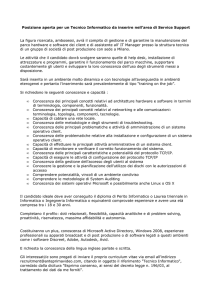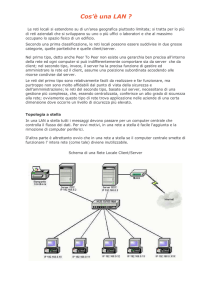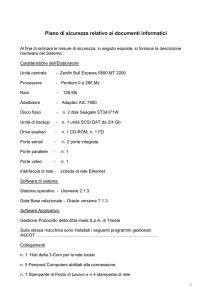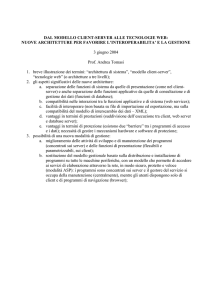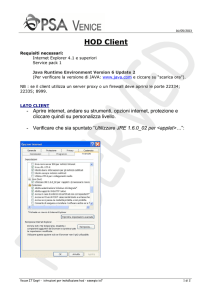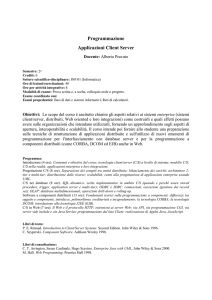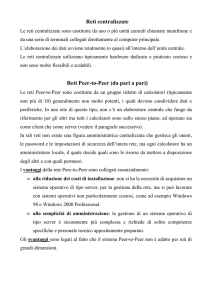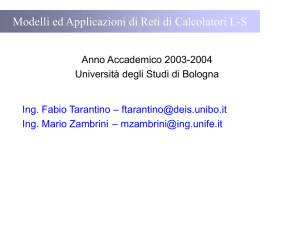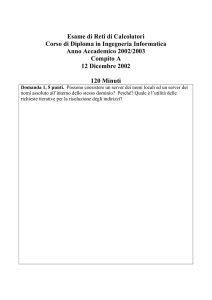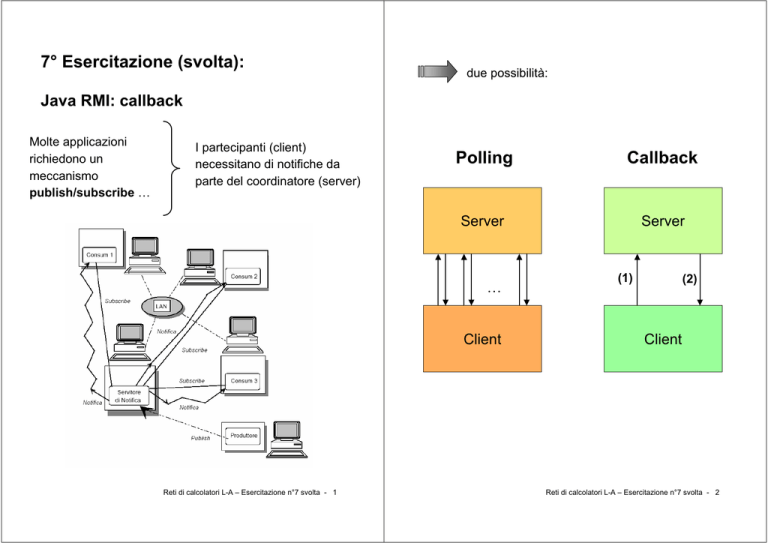
7° Esercitazione (svolta):
due possibilità:
Java RMI: callback
Molte applicazioni
richiedono un
meccanismo
publish/subscribe …
I partecipanti (client)
necessitano di notifiche da
parte del coordinatore (server)
Polling
Callback
Server
Server
…
Client
Reti di calcolatori L-A – Esercitazione n°7 svolta - 1
(1)
(2)
Client
Reti di calcolatori L-A – Esercitazione n°7 svolta - 2
Callback con Java RMI
Come realizzare la callback
Client Callback: meccanismo che permette ad un
client di essere notificato dal server al verificarsi
dell’evento per cui si è registrato e messo in attesa.
Lato client:
bisogna fornire il metodo remoto che il server deve
invocare per fare la callback
Invocazione di un metodo
remoto del client
1. definire l’interfaccia remota del client, in cui viene
dichiarato il metodo di callback invocato dal
server
Notifica del server
=
2. implementare l’interfaccia remota del client,
ovvero implementare il metodo di callback
Invocazione di metodi remoti
bidirezionale
RMI Registry
lookup
bind
Client
(1)
Server
Stub
3. istanziare
l’implementazione
dell’interfaccia
remota del client e passarla al server che la
utilizzarà per invocare il metodo remoto di
callback
Lato server:
Server
(4)
(2)
Client
Skeleton
Server
Skeleton
Remote Reference Layer
(3)
Client
Stub
Remote Reference Layer
Transport Layer
bisogna mantenere un riferimento al client su cui fare
la callback
1. definire l’interfaccia remota del server, come
sempre, in particolare è necessario definire il
metodo di de/registrazione che il client invoca
per inviare al server il proprio riferimento remoto
2. implementare l’interfaccia remota del server
3. istanziare
l’implementazione
dell’interfaccia
remota del server e pubblicarla sul registry
Reti di calcolatori L-A – Esercitazione n°7 svolta - 3
Reti di calcolatori L-A – Esercitazione n°7 svolta - 4
Esercizio: Chat
Implementazione del client:
Definizione dell’interfaccia remota del client:
Realizzare un’applicazione che implementi una chat,
public interface ChatClientInterface
extends java.rmi.Remote{
in cui:
public String name()
throws java.rmi.RemoteException;
• i client si registrano, mandano messaggi fino
public void callback(String who_what)
throws java.rmi.RemoteException;
all’inserimento dell’EOF da tastiera, infine si
}
cancellano e terminano;
Implementazione dell’interfaccia remota del client:
• il server tiene traccia dei client registrati, per ogni
nuova registrazione notifica a tutti i presenti nella
public class ChatClientImpl
extends UnicastRemoteObject
implements ChatClientInterface {
room il nuovo ingresso, per ogni messaggio
String my_name;
ricevuto notifica a tutti i presenti il messaggio con
public ChatClientImpl(String name)
throws RemoteException
{ my_name=name; }
il mittente, per ogni uscita notifica a tutti i presenti
l’uscita. Ogni notifica viene effettuata invocando
public String name()
throws java.rmi.RemoteException
{ return my_name;}
una callback.
public void callback(String who_what)
throws java.rmi.RemoteException
{ System.out.println(who_what); }
}
Reti di calcolatori L-A – Esercitazione n°7 svolta - 5
Reti di calcolatori L-A – Esercitazione n°7 svolta - 6
Programma client:
/* creazione istanza del client */
System.out.println("What is your name?");
String name = br.readLine();
Creazione di una istanza di ChatClientImpl, che viene
poi passata per riferimento remoto al server; il server
utilizzerà tale riferimento per invocare il metodo
remoto di callback:
ChatClientImpl client_ref =
new ChatClientImpl(name);
public class ChatClient {
public static void main(String args[]) {
String hostName = null;
int RMIPort = -1;
/* controllo argomenti (vedi sorgenti) ... */
try {
InputStreamReader is =
new InputStreamReader(System.in);
BufferedReader br =
new BufferedReader(is);
String registryURL =
/* registrazione client-->ingresso chat room */
System.out.println("Registering for chat");
server_ref.register(client_ref);
/* ciclo di permanenza nella chat room */
System.out.println("Enter messages,
EOF to exit ");
String message;
while((message=br.readLine())!=null){
server_ref.saySomething(message, client_ref);
}
/* uscita dalla chat */
server_ref.unregister(client_ref);
System.out.println("Unregistered from chat.");
System.exit(0);
} // end try
"rmi://" +hostName+ ":" +portNum+"/chat";
/* recupero riferimento al server */
ChatServerInterface server_ref =
(ChatServerInterface)Naming.
lookup(registryURL);
System.out.println("Lookup completed " );
Reti di calcolatori L-A – Esercitazione n°7 svolta - 7
catch (Exception e) {
System.out.println(
"Exception in ChatClient: " + e);
System.exit(1);
} // end catch
} //end main
}//end class
Reti di calcolatori L-A – Esercitazione n°7 svolta - 8
Implementazione del server:
Definizione dell’interfaccia remota del server; si noti
che sono presenti sia il metodo per la
de/registrazione dei client, sia il metodo per la
pubblicazione dei messaggi:
public interface ChatServerInterface
extends Remote {
public void register(
ChatClientInterface client_ref)
throws java.rmi.RemoteException;
public void saySomething(String message,
ChatClientInterface client_ref)
throws java.rmi.RemoteException;
public void unregister(
ChatClientInterface client_ref)
throws java.rmi.RemoteException;
}
Implementazione dell’interfaccia remota del server:
/* metodo di registrazione: inserisce in una
lista il client che vuole registrarsi */
public synchronized void register(
ChatClientInterface client_ref)
throws RemoteException{
if (!(clientList.contains(client_ref))) {
clientList.addElement(client_ref);
System.out.println("Registered new client ");
String callback_msg =
"Entrance of "+client_ref.name()+"\n";
doCallbacks(callback_msg);
} // end if
else {
System.out.println(
"register: client already registered.");
} // else
} // end register
/* metodo di invio di un messaggio */
public void saySomething(String message,
ChatClientInterface client_ref)
throws java.rmi.RemoteException{
String callback_msg =
client_ref.name()+”:”+message+”\n”;
doCallbacks(callback_msg);
} // end saySomething
public class ChatServerImpl
extends UnicastRemoteObject
implements ChatServerInterface {
private Vector clientList;
public ChatServerImpl() throws RemoteException {
super( );
clientList = new Vector();
}
Reti di calcolatori L-A – Esercitazione n°7 svolta - 9
Reti di calcolatori L-A – Esercitazione n°7 svolta - 10
/* metodo di cancellazione:
elimina dalla lista il client che vuole
cancellarsi */
public synchronized void unregister(
ChatClientInterface client_ref)
throws RemoteException{
if(clientList.removeElement(client_ref)) {
System.out.println("Unregistered client ");
String callback_msg =
”Exit of “+client_ref.name()+”\n”;
doCallbacks(callback_msg);
} else {
System.out.println(
"unregister: client wasn't registered.");
}
} // end unregister
/* metodo che fa la callback
a tutti i client registrati */
private synchronized void doCallbacks
(String msg) throws RemoteException{
System.out.println(
"***** Callbacks execution *****\n");
for (int i = 0; i < clientList.size(); i++){
ChatClientInterface nextClient =
(ChatClientInterface)clientList.elementAt(i);
nextClient.callback(msg);
} // end for
} // end docallbacks
} // end server class
Reti di calcolatori L-A – Esercitazione n°7 svolta - 11
Programma server:
Creazione e pubblicazione presso il registry di una
istanza di ChatServerImpl:
public class ChatServer
{
public static void main(String args[]) {
InputStreamReader is =
new InputStreamReader(System.in);
BufferedReader br = new BufferedReader(is);
String registryURL; int RMIPortNum = -1;
/* controllo argomenti (vedi sorgenti) ... */
try{
startRegistry(RMIPortNum);
/* istanziazione del server e
pubblicazione sul registry */
ChatServerImpl server_ref =
new ChatServerImpl();
registryURL =
"rmi://localhost:"+ portNum +"/chat";
Naming.rebind(registryURL, server_ref);
System.out.println("Chat Server ready.");
} // end try
catch (Exception re) {
System.out.println(
"Exception in ChatServer.main: "+re);
System.exit(1);
} // end catch
} // end main
Reti di calcolatori L-A – Esercitazione n°7 svolta - 12
/* metodo che verifica se c’è già un registry
attivo sull’host e porta indicati, e se non c’è
lo crea */
private static void startRegistry(int RMIPortNum)
throws RemoteException{
try {
Registry registry =
LocateRegistry.getRegistry(RMIPortNum);
registry.list( );
}
catch (RemoteException e) {
Registry registry =
LocateRegistry.createRegistry(RMIPortNum);
}
} // end startRegistry
} // end class
Compilazione:
Compilazione delle interfacce remote:
javac ChatClientInterface.java
javac ChatServerInterface.java
Compilazione delle implementazioni delle interfacce,
del client e del server:
javac ChatServerImpl.java
javac ChatClientImpl.java
javac ChatServer.java
javac ChatClient.java
Implementazione di LocateRegistry.getRegistry(String):
public static Registry getRegistry
(String host)throws RemoteException{
…
Registry registry = (Registry)
sun.rmi.server.RemoteProxy.
getStub("sun.rmi.registry.RegistryImpl",
ObjID.REGISTRY_ID, host, port);
…
return registry;
}
Implementazione di
LocateRegistry.createRegistry(RMIPortNum)
Compilazione con l’rmi compiler delle implementazioni
delle interfacce remote (N.B.: sia del server che del
client!):
rmic ChatServerImpl
rmic ChatClientImpl
per generare stub e skeleton:
ChatServerImpl_Skel
ChatServerImpl_Stub
ChatClientImpl_Skel
ChatClientImpl_Stub
public static Registry createRegistry(int port)
throws RemoteException{
return new sun.rmi.registry.RegistryImpl(port);
}
Reti di calcolatori L-A – Esercitazione n°7 svolta - 13
Reti di calcolatori L-A – Esercitazione n°7 svolta - 14

